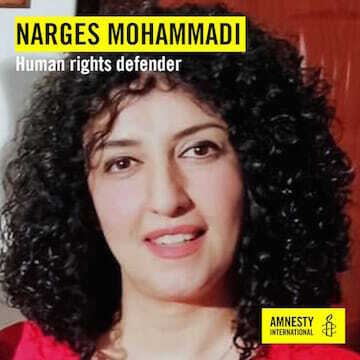Mike Tyson’s iconic quote, “Everybody has a plan until they get punched in the mouth,” serves as a powerful reminder that while one’s intentions and aspirations may initially appear steadfast, they can waver when confronted with unexpected challenges or obstacles. This sentiment takes on even greater significance when applied to the most recent Nobel Peace Prize laureate.
Nobel Peace Prize Laureate
In a world where many people may self-identify as advocates for freedom and human rights, few are genuinely prepared to endure the significant sacrifices and hardships necessary to enact substantial change. However, the recent Nobel Peace Prize recipient emerges as a remarkable exception to this norm. Through her unwavering activism, even in the face of personal adversity and imprisonment, she has demonstrated a hypnotic dedication to her cause that sets her apart. Her actions resound as a testament to the profound focus and commitment required to champion the cause of human rights and freedom.
At the age of sixteen, Ali has a vivid recollection of the last time he saw his mother at their family home. That morning, she prepared eggs for breakfast for him and his twin sister, Kiana, imparting words of encouragement to excel in their studies before bidding them farewell and sending them off to school. However, upon their return later that day, their mother, Narges Mohammadi, was conspicuously absent, marking their tender age of eight when they last laid eyes on her.
Narges Mohammadi, a name synonymous with the relentless fight for human rights in Iran, has paid an immense price for her activism. On a recent Friday, the Norwegian Nobel Committee bestowed upon her the prestigious Nobel Peace Prize in recognition of her unwavering struggle against the oppression of women in Iran and her dedication to advancing human rights and freedom for all, as announced in Oslo.
Mohammadi has spent the majority of the past two decades imprisoned, her sentences repeatedly handed down due to her fearless advocacy for the voiceless, her unyielding campaign against the death penalty, and her endurance of prolonged periods of solitary confinement.
Currently incarcerated and serving a sentence of 10 years and 9 months, she faces accusations of actions against national security and propaganda against the state. Additionally, she has been sentenced to 154 lashes—a punishment that rights groups believe has not yet been carried out—along with travel restrictions and other bans. Nevertheless, the indomitable spirit of Narges Mohammadi has not been extinguished, even within the darkest confines of Tehran’s notorious Evin Prison.
An audio recording from Evin Prison, prior to the Nobel Peace Prize announcement, captures Mohammadi leading the chants of “woman, life, freedom”—the rallying cry of an uprising ignited by the tragic death of 22-year-old Mahsa Jhina Amini in the custody of Iran’s morality police. Mahsa’s alleged offense was improper headscarf wearing.
The recording briefly pauses with an automated message: “This is a phone call from Evin Prison.” As the voices of these brave women resonate, they sing a Farsi rendition of “Bella Ciao,” a 19th-century Italian folk song that transformed into a symbol of resistance against Fascism and has been adopted by Iran’s freedom movement.
In written responses to questions relayed through intermediaries, Mohammadi describes this period as the era of greatest protest within the prison. Despite a brutal crackdown on the protests by Iranian authorities outside the prison walls, spurred by Mahsa Amini’s death, and the resumption of morality police enforcing headscarf rules, Mohammadi and her fellow activists remain resilient.
Mohammadi expressed concerns about the government’s actions and its efforts to suppress the truth regarding Armita Geravand. Outside of her prison activism, Mohammadi has paid a heavy price for speaking out. She was sentenced to an additional year in jail in August for her continued advocacy within the prison, including media interviews and statements about sexual assaults suffered by detainees.
Already imprisoned for publishing a book titled “White Torture: Interviews with Iranian Women Prisoners” and producing a documentary on prisoners enduring solitary confinement—another punishment she has personally endured—Mohammadi remains undeterred in her pursuit of justice.
In her letter, she fiercely criticizes Iran’s four-decade-long mandate of the hijab (headscarf) and condemns the hypocrisy of a religious state that employs sexual violence against female detainees. She points out that the compulsory hijab has been used to project an image of control and subjugation over women, showcasing the religious regime’s dominance over society.
Mohammadi reflects on the 44 years of Iranian women enduring the sweltering heat while being forced to wear head coverings, long coats, dark-colored pants, and in some cases, black chadors. She asserts that this strict adherence to compulsory hijab has subjected women to psychological pressure, all in the name of preserving the image of religious Islamic men and the supposed security and purity of women. Tragically, these same women have become victims of sexual assault and harassment.
Mohammadi courageously recounts incidents of sexual violence against her and fellow female detainees dating back to 1999. Political prisoners and women facing criminal charges have been subjected to assaults by security forces, prison authorities, and medical personnel. Mohammadi observes that sexual violence against women detainees has dramatically escalated since the protests that swept Iran last year, leading her to characterize the abuse as systematic. watch her video here
In Saudi Arabia and other Gulf states, courageous women have actively resisted gender oppression, often at great personal risk, resulting in their imprisonment, suppression, and silencing. Despite some limited reforms in the region, women continue to grapple with significant legal, social, and political restrictions and face ongoing oppression.
The muted response from Western nations regarding this gender repression can be attributed to political considerations. Western countries heavily rely on Saudi Arabia and other Gulf nations for their oil resources, investments, and, arguably, regional security, which contributes to a perceived inconsistency in addressing these human rights issues.







